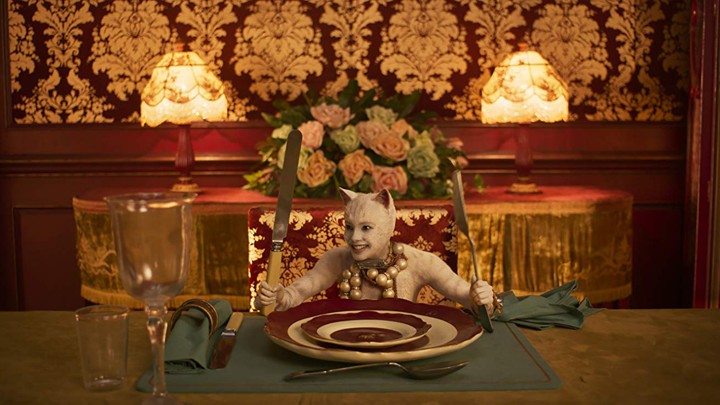by Chris Feil
One month after its catastrophic arrival and its official: Cats has entered the cult pantheon. But unlike the midnight musical tradition set before it by The Rocky Horror Picture Show, this disaster isn’t simply finding an audience that appreciates its merits. If the ultimate schadenfreude response to the film felt pre-baked by the gleefully unhinged reactions to its promotional material, we shouldn’t forget that much of its failed vision falls squarely in the lap of director Tom Hooper.

Cats as a musical is supposed to be earnest, its silly concept a vessel for unbridled imagination from the bombastic funhouse of Andrew Lloyd Webber. Of course, it has always had vocal detractors - it’s still a musical about cats. But for better or worse, it’s a more tuneful score than it’s often credited as, even if it grates...
And Hooper kills the musicality in two crucial ways: he gets in the way of all the things we want from a musical (singing, dancing, spectacle that nevertheless makes sense in our brain) and, even worse, won’t let Cats just be Cats.
His self-seriousness is evident from the jump, with “Jellicle Songs for Jellicle Cats” transformed from a catchy dance spectacle into a dreary mash of wildly disjointed visuals. “Mr. Mistoffelees”, maybe the musical’s most buoyant glittery earworm is instead reimagined as a downtrodden mindfulness exercise to get the magician Jellicle to believe in himself. “Skimbleshanks, The Railway Cat” begins with promise, but is perhaps the most glaring evidence of Hooper’s struggle to capture dance in a compelling way. The one original song, the Taylor Swift cowritten "Beautiful Ghosts", is the most crystalline representation of his vision... because its a dirge.
Musically, Hooper falls back to his old tricks of Live Singing At All Costs as he did with Les Miserables. While this made for some lifeless vocals in that film, here the sound is often at odds with all of the dancing. Surprisingly, this makes a formula for Swift to succeed moreso than her other castmates. Her “Macavity” is unmussed and confident, a vision of what the film could have been if it wasn’t vacillating between too ashamed of itself and too off the rails.
But the live singing hurts no other number more than the one we most anticipate. Tom Hooper wants snot from Jennifer Hudson’s persona-non-Grizabella, and “Memory” never soars as high as it should because of it. He robs us, and the adept Hudson, of the infamous belting refrain that locked Lloyd Webber’s score forever into the annals of history. Luckily, we still have the studio version of the song on the soundtrack to offer us the version where Hudson gets to really belt the number unencumbered.
Perhaps some accidental joy comes from the horror of Judi Dench staring us down in “The Ad-dressing of the Cats”. But this finale shouldn't be a surprise to anyone familiar with the stage version. However, the response to the direct address of the number does reveal the fundamental flaw of Hooper's tinkering. On the stage, the Jellicles basically communicate directly to the audience the whole time; it’s us they’re introducing all these damn cats to. Instead, cynically he adds Francesca Hayward’s Victoria to play an audience surrogate. But after a film’s worth of songs are directed to this newbie among the Jellicle, the conceit gets dropped for the very final number.
And as Dench stares into the camera to remind us the way cats are not dogs, thus a million nightmares are born. It’s not just a bizarre choice, it’s a deeply clunky one - one that not only robs the film of a big finale moment, but one that cements the film in its legacy of insanity. Yet more than the crazy, Cats is defined by its inability to serve its score.
All Soundtracking installments can be found here!